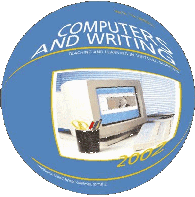 | "Distance education is no longer the great evil. Many DE techniques and strategies are used in more traditional learning environments. In fact, it is often said that the distance between a lecturer and a student is greater than the distance between teachers and students in DE environments. This is difficult to pull off as a teacher, and even more difficult from the administrative side. There are competing forces at work. Still, we're all on the same time, aren't we?"
Mark Walbert -
Pete Sands -
Judi Kirkpatrick -
Susan Lang -
Joel English -
Trish Harris -
Cynthia Jeney -
|
|
Susan Lang – "Distance Education at Texas Tech University: Getting Started and Getting Established"
Joel English, raises some interesting ideas–the one I'm thinking of currently is the "team" concept for teaching some of which, in a different form–we are experimenting with at Texas Tech University. As of this coming fall, in fact, the first-year writing program at TTU is implementing across the board a pedagogy that separates the traditional responsibilities of managing classrooms of students and responding to student writing. No longer will the same individual be responsible for teaching a particular group of students and responding to their documents. Instead, the evaluation of student documents will be shared by a number of individuals; while a particular instructor may grade some of their own students' work, it won't necessarily work out that way.
But more on this in a later C&W session. The meeting at hand concerns distance education. And the reason I bring up the reconfiguration taking place at Texas Tech is that we are also incorporating many of the same ideas into a newly-formed collaboration with our extended studies (distance ed) program. Yes, over the last few months, my colleagues and I have been discussing with the folks in extended studies the possibility of bringing our courses more in line with each other. After a series of discussions, it seems that we've done better than that; we've found ways to incorporate our extended studies students into the same program/the same curriculum that our onsite students will use. This program will also begin in the fall.
And we aren't just talking about distance education at the undergraduate level. Last summer, I taught two sections of a graduate course in our Master's program in Technical Communication. That course incorporated as do all of our courses in the program weekly (in the case of a summer course, twice weekly) discussions in the TTU English MOO, frequent writing, student presentations all elements common to our onsite courses as well.
My point in putting these two ideas on the table is to say that not only do I think we should get involved, at TTU we are already involved. Our Master's program will graduate its first students in the next 12 months; those courses are full (capped at 15) with students from around the U.S. and beyond. The Technical Communication and Rhetoric (TCR) program was given two new tenure-line appointments this past year and has a commitment from upper administration to hire in two more lines for the 2002/2003. The success of our distance program, while not the only factor, is certainly part of the reason for this new funding that will benefit both onsite and online students.
 
|
|
